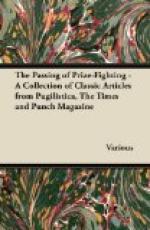My first letter detailed my qualifications, which were very exceptional; explained that my intelligence and industry were far above the average; that I was morbidly conscientious, and willing to sacrifice all my own interests for the needs of the firm; that the reason for leaving my last position was solely a matter of circumstances over which I had no control, and that at an interview, which I craved, I would explain everything to everybody’s satisfaction and prove my perfect eligibility for the post. And so forth.
I waited a fortnight. There was no reply. I therefore despatched a follow-up letter. I explained my regret at receiving no response to letter No. 1, and suggested that perhaps it had been inadvertently overlooked, or had gone astray in transit. Alternatively I hinted that perhaps the firm regarded the list of my qualifications as incredibly pretentious, and I assured them that it in no way exaggerated my good points. I had indeed become, if possible, even more conscientious and industrious since I had last written, and having recovered from a cold in the head from which I was then suffering I was actually in better physical condition than before. I reminded the firm that in granting me a preliminary interview they incurred no liability whatsoever.
Another two weeks went by, and still no answer. So I despatched Follow-up Letter No. 2.
This briefly referred to my two previous communications, and asked whether it was not clear to them that, by securing my services while I was in possession of all my faculties and the full vigour and strength of my being, there were advantages they could not possibly acquire with me in, say, another thirty years, when I should probably be suffering from rheumatism, chronic dyspepsia, deafness, dim sight, loss of memory and certainly from approaching old age. I concluded by offering them three days’ free trial (I always do best in the first three days); if I failed to give satisfaction by the end of that period they could return me without incurring any obligation whatsoever.
Again two weeks passed away, and there was still no answer. So I sent Follow-up Letter No. 3.
In this I announced a Special Offer, viz., a reduction of twenty pounds sterling (L20) on the salary originally asked if the firm engaged me within ten days from the date of the offer.
I gave them twelve days in which to respond, but still received no answer, so, after allowing a further two days’ grace, I despatched Follow-up Letter No. 4, stating that as they had evidently been prevented from replying to my special offer I had decided to extend the period for acceptance by fourteen (14) days, reckoning from the date of the present communication. At the end of that period the salary demanded would be increased by ten pounds (L10) over and above that asked in my first application. Thus, by accepting the existing offer of twenty pounds (L20) reduction, they would really be securing me at thirty pounds (L30) less than my market price.




